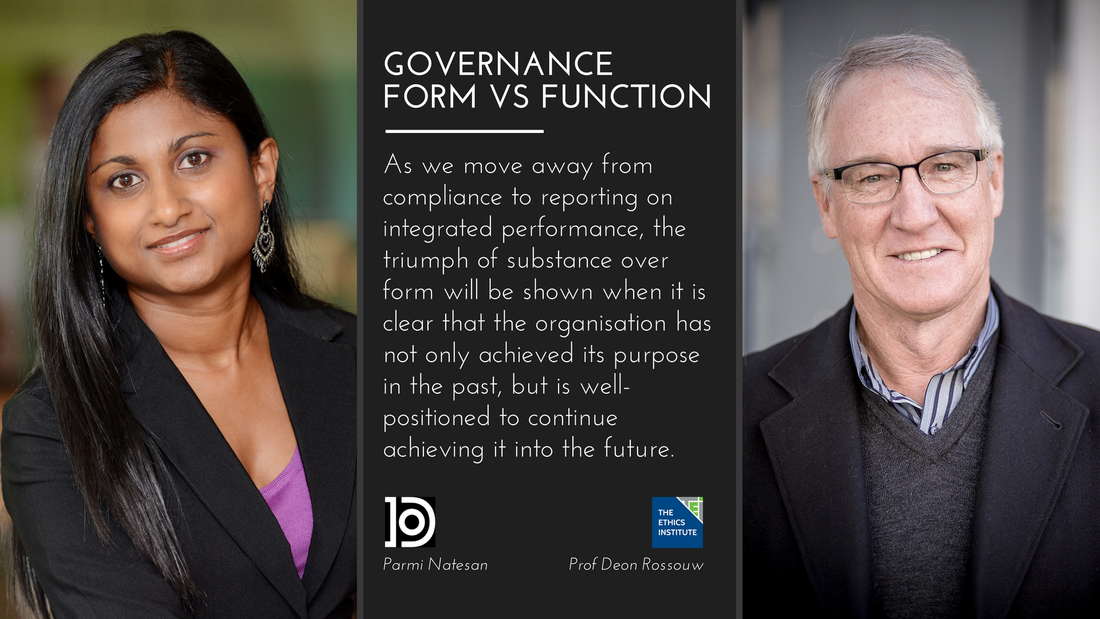|
One of the most persistent challenges relating to governance is the tendency to focus on form rather than substance. In line with King IV, it’s time finally to accept that governance is not an end in itself, but a tool for delivering outcomes, says Parmi Natesan, Executive: Centre for Corporate Governance at the Institute of Directors in Southern Africa (IoDSA) and Professor Deon Rossouw, CEO of The Ethics Institute.
“Organisations only exist in order to deliver on their purpose and, similarly, governance only exists in order to help them do that,” says Professor Rossouw. “Governance got a bad name because people persist in seeing it in terms of compliance, structures and policies. Of course, these things are important only as tools to help deliver outcomes.” This focus on outcomes is very much a feature of King IV, which was designed to link governance practices with four governance outcomes, notes Ms Natesan. “The critical point is that structures need humans to give them life, to use them to deliver the desired results. Governing bodies must therefore ensure that the governance structures are indeed achieving the desired governance outcomes,” she says. King IV identified four governance outcomes: an ethical culture, good performance, effective control and legitimacy. Boards can therefore measure whether the structures they have put in place, and the way they are being used, are effective by measuring the extent to which these outcomes are being attained. Clearly, then, the personal qualities and actions of the members of the governing body are critical in ensuring that the governance objectives are achieved, that substance follows form. King IV retained the four cardinal values that should underpin good governance—responsibility, accountability, fairness and transparency (RAFT)—but added two further ones: integrity and competence. This recognises that governance structures will only be valuable if they are used by people who are prepared to put their own interests aside and act ethically in the best interests of the organisation, beyond mere legal compliance, and who have the requisite knowledge both of the organisation and the industry in which it operates. “It is important to recognise that governing-body members have to cultivate these characteristics in order to make them instinctual,” Professor Rossouw argues. “People aren’t born with integrity, competence or any of the others, they have to be nurtured.” As with any enterprise involving human behaviour, moving from form to substance is no easy task. Some guidelines for assisting are: • Select members of the governing body carefully. It all begins with selection, says Professor Rossouw, so nomination committees must actively seek people with these cardinal virtues. • Orient new members properly. Once selected, it is vital that new members of the governing body are properly educated about what their new role entails, and continually reminded that they are there primarily to serve the best interests of the organisation, not those of any particular stakeholder. • Structure meetings carefully to ensure that members have the right types of conversation, and do not confine themselves to ticking the boxes. Courage becomes important here—not just moral courage but also the courage to take the right risks. • Hold members of the governing body accountable. There are several elements to this. First, peer pressure must be harnessed to create a positive atmosphere in which members continually assess their own performance and that of their fellow members. Courage will also be at a premium here but it is equally important the board is truly diverse, says Ms Natesan. This is needed to overcome the “buddy mentality” in addition to measures like gender, race and age. At the same time, though, it must be recognised that self-appraisal is no substitute for the stakeholders assessment of the extent to which the four governance outcomes have been achieved. Ms Natesan stresses that there is not necessarily more unethical behaviour now, just that it is more visible—something she sees as positive. She argues that, going forward, how governing bodies disclose about governance and its results will become more and more important. The disclosure must convince stakeholders not just that the right governance structures are in place, but that they are delivering results, she says. Looking forward, adds Professor Rossouw, as we move away from compliance to reporting on integrated performance, the triumph of substance over form will be shown when it is clear that the organisation has not only achieved its purpose in the past, but is well-positioned to continue achieving it into the future. ENDS MEDIA CONTACT: Juanita Vorster, 079 523 8374, [email protected], www.atthatpoint.co.za For more information on the IoDSA please visit: Website: www.iodsa.co.za Twitter: @The_IoDSA LinkedIn: Institute of Directors in Southern Africa Company Page
0 Comments
 Institute of Directors in Southern Africa & The Ethics Institute Eskom’s decision to pursue disciplinary action against its suspended acting-CEO, Matshela Koko, raises important governance and ethical issues that directors and executives should consider carefully, say Parmi Natesan, Executive: Centre for Corporate Governance at the Institute of Directors in Southern Africa (IoDSA) and Professor Deon Rossouw, CEO of The Ethics Institute (TEI). “Mr Koko stands accused of influencing the awarding of lucrative contracts to a company in which his stepdaughter is a director. While we should be careful not to prejudge this specific case, conflicts of interest like this represent a major hazard for board members and executives, if they are not managed correctly from the start. All of us should see Mr Koko’s predicament as a wake-up call to make sure our own houses are in order,” says Natesan. The first point to make is that a senior executive like Mr Koko is both an employee of the company; and a deemed director or prescribed officer in terms of the Companies Act. Such a person is thus bound both by the internal policies of the company and the legal requirements of the Act. As regards the former, it would be necessary to see whether any company policies were breached in the way the contracts were awarded, and whether Mr Koko was himself involved in this process, and whether he disclosed his interest appropriately. “It needs to be made clear that claiming ignorance is not a good enough defense. As a senior executive, Mr Koko should have investigated actively the interests of any of his related parties, even to the extent of requesting them in writing to inform him if they had any interests in organisations doing business with the company,” she explains. “This would show that he took reasonably diligent steps to be informed. One should never lose sight of the fact that as a senior executive, he has to set an example to the rest of the organisation and protecting its reputation.” Natesan notes that conflicts of interest are to be expected in business, and do not necessarily constitute evidence of any impropriety: the key issue is how they are handled. King IV thus recommends that members of governing bodies should declare their financial, economic and other interests, and those of their related parties, at least annually. In the same vein, each board or board-committee meeting should be prefaced by a formal declaration of any specific conflicts of interest relating to the agenda. Professor Rossouw points to the fact that humans are naturally inclined to act in their own interests or in the interests of their immediate family and friends. While the Companies Act and governance codes like the King Reports are examples of legal and voluntary constraints to the pursuit of self-interest, they will ultimately prove ineffectual unless the individuals concerned act ethically. “I find it significant that the very first principle of the King IV Code on Corporate Governance emphasises that members of governing bodies, both individually and collectively, should act in an ethical manner. In unpacking what is meant by ethical behaviour, the Code starts by focussing on the personal integrity of members of the governing body. They are reminded that as directors, they must act in the best interest of the company, and that they must deal with conflicts of interest appropriately. King IV sees integrity as a characteristic that should be cultivated and exhibited, so that directors develop the inclination to act in the company’s best interests, not their own” he says. “By sensitising directors not only to actual conflicts of interest but also potential or perceived ones, ethics plays a crucial role in avoiding the reputational damage and financial costs when a conflict of interest is found, or even suspected not to have been handled correctly —as we see in the case of Mr Koko.” ENDS MEDIA CONTACT: Carla Coetzee, 072 112 8347, [email protected], www.atthatpoint.co.za For more information on the IoDSA please visit: Website: www.iodsa.co.za Twitter: @The_IoDSA LinkedIn: Institute of Directors in Southern African Company Page For more information on The Ethics Institute please visit:[DR1] Website: www.tei.org.za Twitter: @EthicsInst LinkedIn: The Ethics Institute Company Page |
Archives
July 2024
Categories
All
|


 RSS Feed
RSS Feed